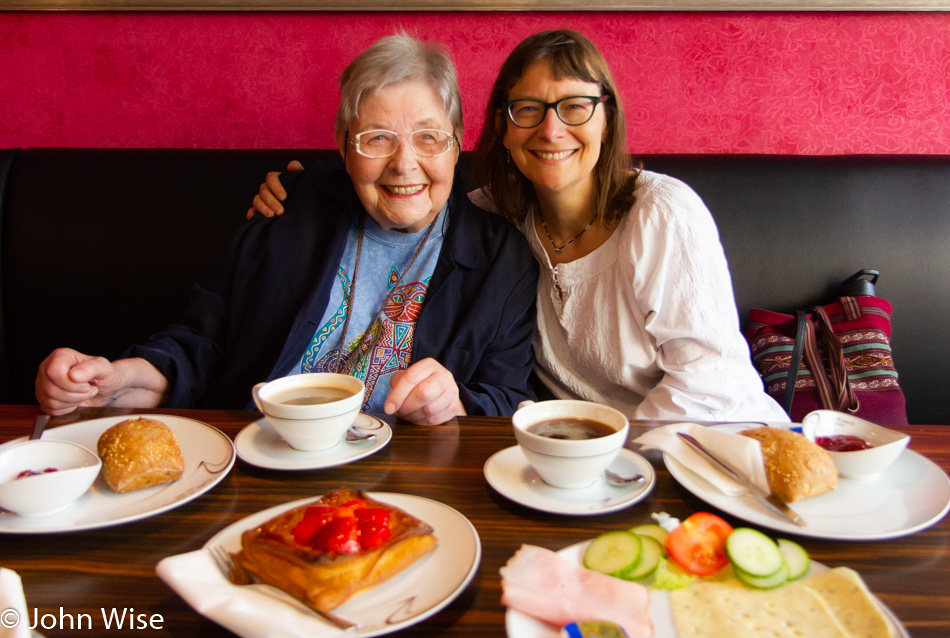
We carved some time out of the morning and arranged to have breakfast with Jutta before Caroline and I went our separate ways. The plan was for Caroline to visit her godmother Helga for the day and me to go elsewhere. This was my suggestion as my German is poor at best, and I feel that this, in turn, inhibits the flow of conversation as others make concessions to include me. Without me present, Caroline will be able to have a deeper and more meaningful visit, or so is the thought. Turns out that I was right, as Caroline didn’t return from her visit until after 10:00 p.m., so this day is more about me instead of us.
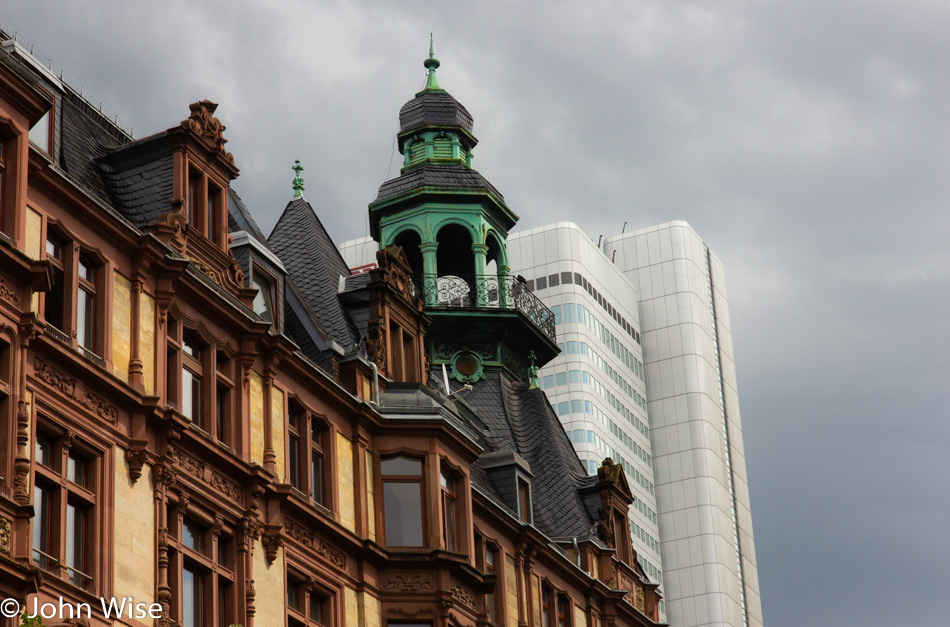
Thunderstorms were forecast for yesterday, too, but today, it looks like we might actually find some poor weather. Until we do, I will do my best to stay in motion. After I walked Jutta back to her apartment, Caroline had to make her way to Konstablerwache to catch the train to Bad Soden, and I walked down Bergerstrasse, recording the audio of the length of the street between train stops. This was my first “Field Recording” made in a cityscape, and it created a very different perspective of something that might have been routine just before doing such an exercise. We all hear the conversations and traffic when we walk through the city, but rarely would such isolated sounds and distinct elements make themselves heard.
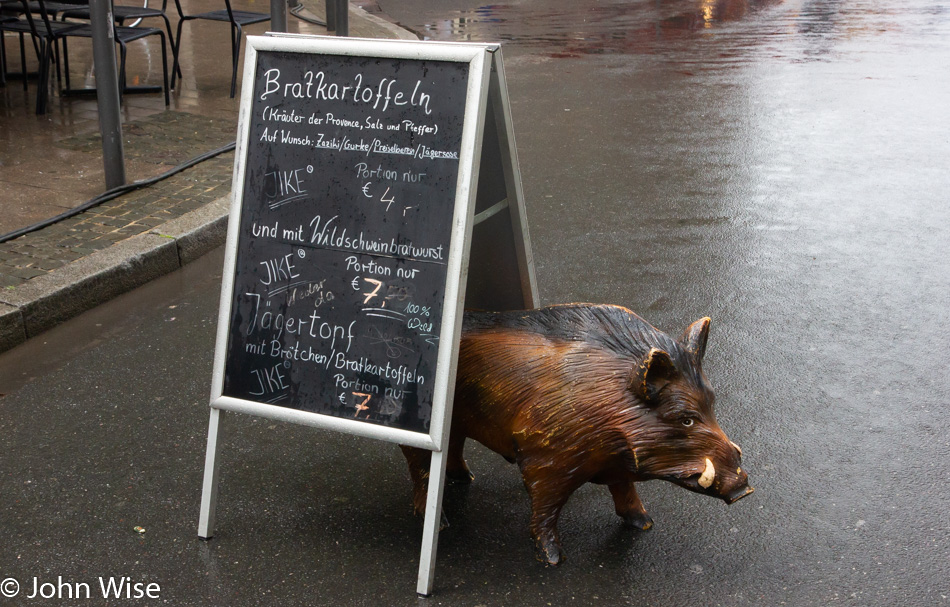
Originally, I planned to board an ICE train for Limburg, but the sounds I was experiencing had me wandering around Frankfurt longer than I had anticipated. Then the rain came, and I took shelter for a short time as I hadn’t brought an umbrella or the rain jacket I’d packed back in Phoenix.
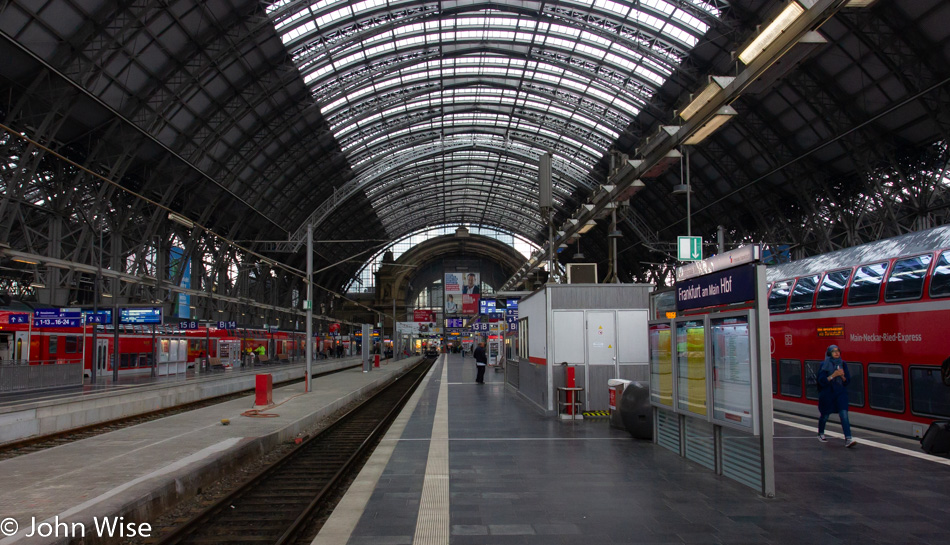
The Frankfurt Hauptbahnhof (main train station) has an amazing soundscape with so many people coming and going along with the public announcements that echo through the massive arched steel open building. It took a decision of constraint to not get lost wandering around Frankfurt exclusively and recording hours of what I was hearing, so I turned off the recorder, put away the microphones, and plugged into some music to see the city through a different filter.
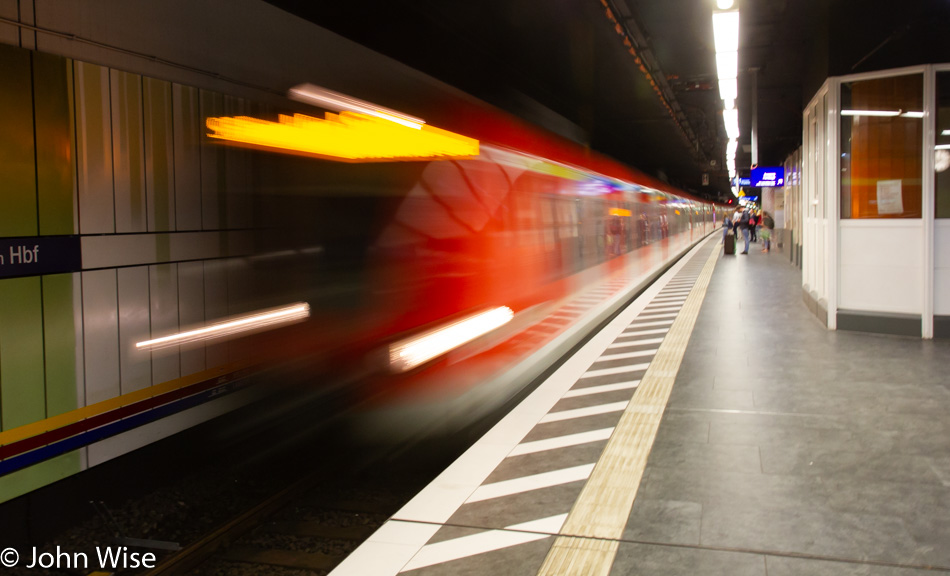
The decision was made to head to Hanau instead of Limburg, as it was noon before I was getting out of Frankfurt. My train was the S9, and this would be the first time in more than two dozen years that I’d been on one. Back in 1985, when I arrived in Frankfurt, it didn’t take long for me to buy tickets for random locations that the train went to, and I’d ride along until an interesting-looking stop drew me in to disembark and explore the locale. Back in Phoenix, the plan was that while Caroline was visiting particular family members, I’d recreate that experience from thirty-three years earlier and listen to some music on my way to somewhere I wasn’t familiar with.
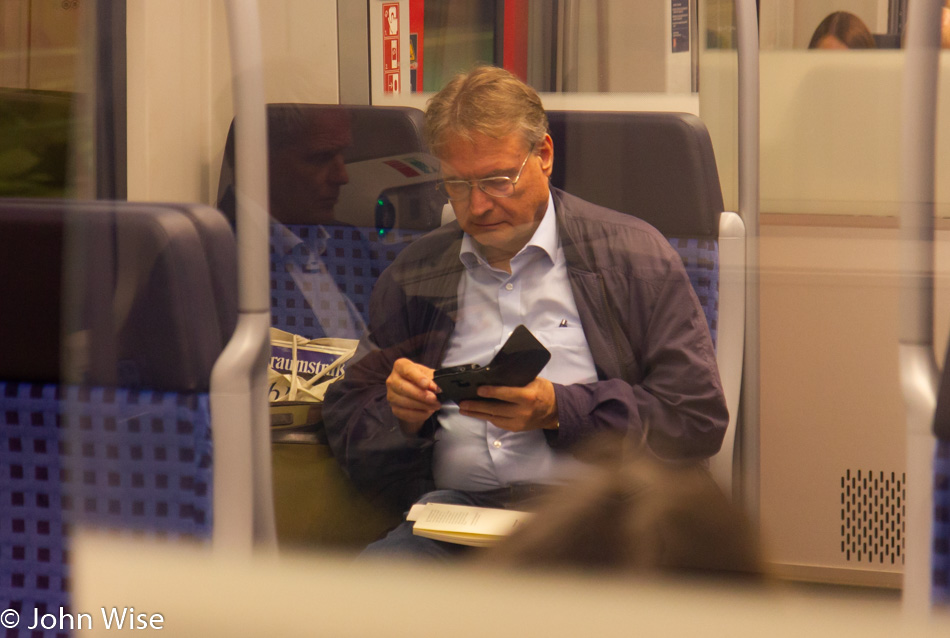
Once on the S9, I stood by a set of doors with my headphones plugged in, and the next song in the playlist was “Pick Up The Phone” from The Notwist. Funny how the poetry of a song can feel so appropriate and resonate at a particular time when, just prior, it may have only been a catchy song.
The song starts with, “You know this place,” which, of course, I do to some extent, as I lived in Frankfurt for the better part of 10 years. I say to some extent, as time changes everything, and this city has changed dramatically with the end of the Cold War and the fall of the Eastern Block. Now, put 33 years between my arrival in 1985 and today in 2018. Back then, this was Germany, and it was exotic to my senses; today it feels pedestrian with a shifting identity that doesn’t much feel like it’s fixed in anything particular. Those changes were being seen by the time we’d left in 1995, but back then, one couldn’t know just which way the culture might shift again as it was already in deep flux.
The next line, “You know this gloom?” is answered with a yes. I know the rain, the smell of stale smoke, sour beer, and various fuels. The gloom is exacerbated by the dull clothes that moved away from a distinct “European” feel to sports clothes, jeans, running pants, pastel colors, a few international brands adorning t-shirts, and something quite new: size XXXL. While the site of vapes is seriously uncommon, cigarettes are not. Aggressive begging doesn’t feel as prolific, but the hoodlum/thug still roams the streets.
“We’ve been here before.” Culture changes, and with deep economic shifts, culture can be ratcheted into a convulsion that Europe has seen before. Post World War II, Germany required Turkish migrants to fill the gap left by so many dead German men of a certain age; today, Germany needs immigrants to fill jobs that are dirty, non-challenging, and required to keep the gears on the machine. But this is causing conflict due to the appearance of the other, not the Jew this time, but the headscarf and dark complexion. You can’t not see it. West Germany was, in some ways, isolated, and with the American occupation, it was tightly controlled. While diversity today has the environment looking more like Amsterdam in the mid-eighties, there is a tension where the clash of cultures seems to just be taking root. If I were a betting man, I’d wager that Germany will take the same path as America and opt to accept mediocrity among the minorities and the native Germans who are gravitating to the lower rungs of intellectual power because the stupidity of consumption is more satisfying than making an effort to understand change where leadership is at a loss to guide with a clear vision.
This line, “When life is a loop,” resonates with me, particularly at my age of 55 years old as recently I’ve been seeing a lot of myself in others. Not in older people yet because while I’m close to that age of seriously old, I’m far enough from my 20s to see who I was in the young couple walking down the street holding hands or ringing the doorbell of a friend they are visiting. They are confident and yet uncertain, bold and yet unknowing exactly what is ahead. They cannot see their conformity approaching; they own the world in their naivete, and everyone else plays second fiddle to their awesomeness, but they are average, common even. My loop is to attempt to find what’s new, to try what I’ve not already tried, but isn’t this then a routine that is negating the new by doing what I’ve practiced doing for over 40 years? I supposed going to Burma to become a monk or sacrificing myself in a volcano to appease a god I do not know or fully understand would be a kind of new that would be truly outside my hamster wheel.
“You are a room without a door.” Is this life? We walk around our existence, and to us, the next turn is our version of novelty being exposed to us in such a way that surely no one else before me has understood and gained insight in just the same way as I am right now. The truth is that I’m in the room with Socrates and Hitler, Edison and Musk, Rembrandt and I.M. Pei, only they are now ghosts but I’m still walking in their shadows. I cannot build my own room, nor can I escape the small space I’ve created for myself with the help of those who helped shape me and my environment. Everyone walking around me is merely walking within the confines of their own constructs, and while they may see me, I will have been nothing to their reality besides a stage piece that played a minor role of the guy sitting in a coffee shop on yet another random day.
And here’s the key, “Pick up the phone and answer me at last.” All these faces looking into their phones, some texting, some scanning photos, playing games, reading the news, checking the social network, checking their bank accounts, or listening to The Notwist. We are trying to open a window to the universe and find something because, in our immediacy and the environment, we are starting to comprehend we have nothing left but routine. The phone just might be the escape, a path to the other, and a connection to the unseen and unknown who could have the larger answers. We tried for thousands of years to find it in the shadows of the fire and for hundreds of years on the printed page. For dozens of years, the television and maybe the movies would show us our meaning and purpose, but they have failed, too.
We may never escape our room, but can we push the walls further out? Can we expand our dimensions? Or is our inner animal inherently too frightened and mistrusting to invite others into the intimacy of our space? Maybe when we left the cave, we forgot what community was. In the city, there are more who we don’t and can’t know, while in social media, we have started to get glimpses of like-minded members of our species, but this also seems to be creating another type of existential crisis. What lies deep within us that for millennia we’ve been trying to escape intimacy and knowing one another as we may have in primitive cultures, or is this just a romantic notion where the reality is we’ve always been alienated by our intellect to wonder just what it is we are doing here?
Today, I will step out of my past.
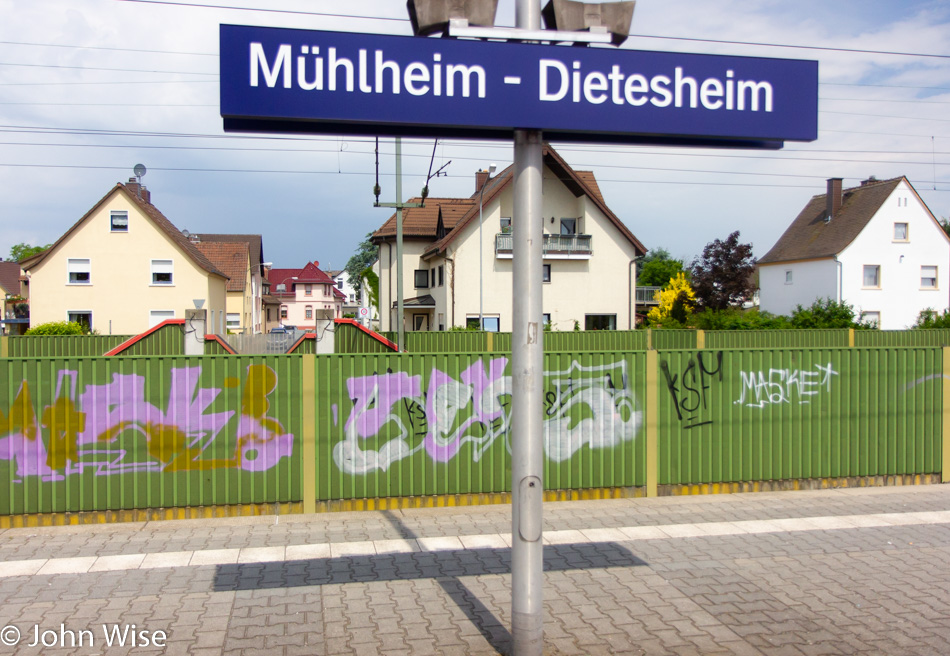
The song changes along with the perspective, and soon, I’m on another tangent. Emotion plays large as not only does the landscape trigger a thousand memories, but the soundtrack adds another dimension of memories being laid down for the future.
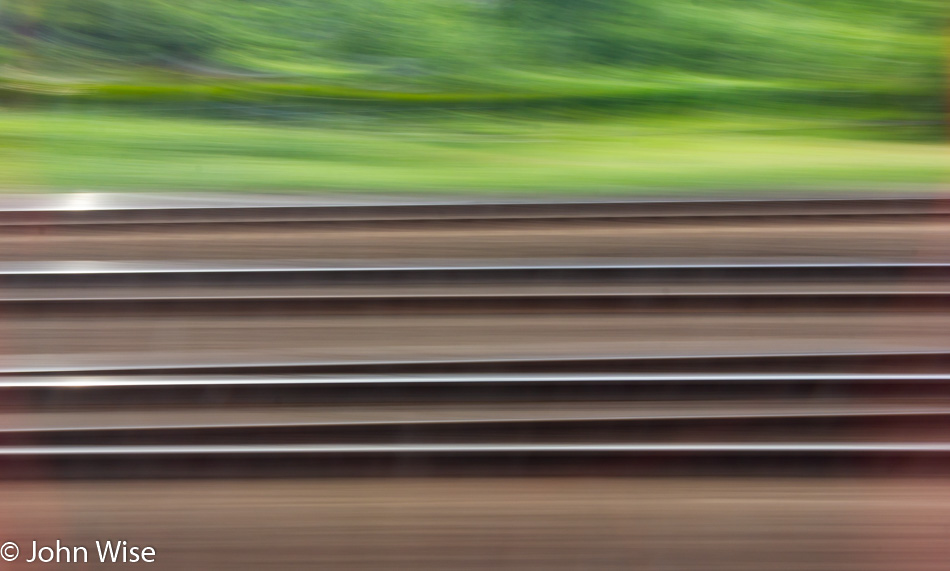
There’s such joy in watching our world zip by when it’s a leisurely affair because someone else is doing the driving, and we are moving efficiently. Sometimes in Europe, it is better to get from one place to another via the train and not have to worry about parking and the horrible congestion that accompanies bigger cities. In a few days, we’ll head to points south, and for that, we have a car, but we also have many miles to cover, and for the most part, we will be avoiding population centers.
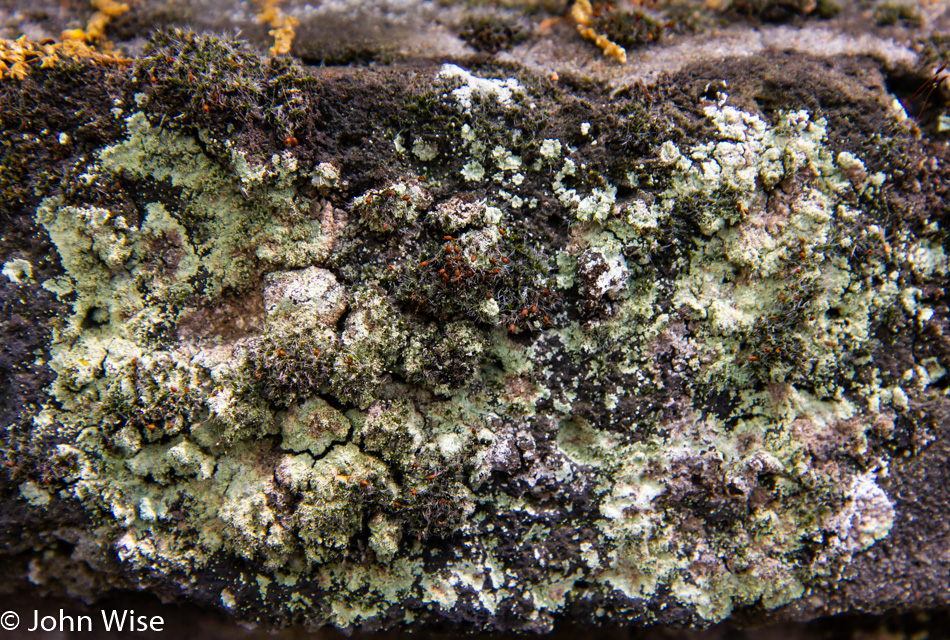
After leaving the Hanau Hauptbahnhof, the 1.9km walk to the city center passes the city’s main cemetery. The wall doesn’t seem that old, but there is a fair amount of lichen and moss growing on it. I know it may not be as interesting as architectural or landscape views to some; for me, though, it is a small detail that, in some way, is a better reminder of some of the small things I see along the way.
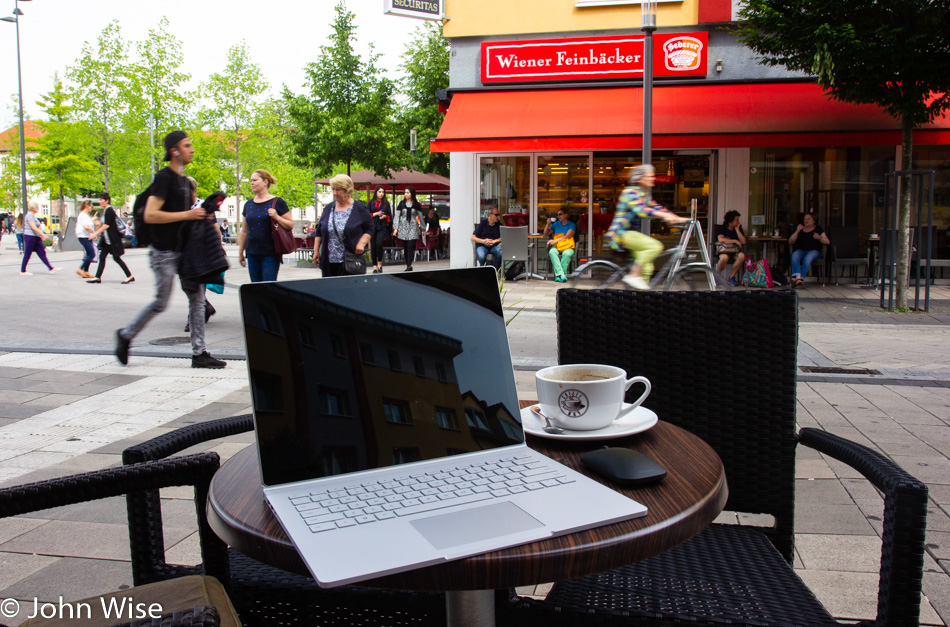
Thirty-three years ago, I would take a train to a station, and with the newspaper, I’d grab something for breakfast and sit somewhere to watch people go by. Today, I’m sitting in Hanau at the corner of Am Freiheitsplatz and Fahrstrasse, and instead of reading other’s words, I write my own.
Back then I couldn’t write because I didn’t know enough about myself, and so the best I could do was try to witness life. This is a hint of “The Good Old Days.” I didn’t know, and I burned with the desire to know; today, I still don’t know, but the desire has been tempered with the knowledge that no one ever really knows, and soon we see the looping cycle of it as it has always been, and will probably remain so.
We revel in joy with the child while they remain outside of harmful curiosity for the nostalgic, allowing them to explore the newness of their world while they are still full of innocent curiosity, leading them into play and experimentation. Curiosity for knowledge helps form them for their own time as they celebrate crawling to a place on top of the world. Idealism is the clothing worn by contemptuous youth but will soon be retired upon recognizing the need to sacrifice time for the responsibility that extends beyond the hedonistic self. Sure, some refuse to grow up and will fight for a lifetime so that they can extend their youth and continue an insatiable quest for learning well into later life. These rare characters, though, are sadly marginalized as being out of touch with the greater need to lead others into misery.
Hundreds of people have passed me during the past hour, and I can’t help but see them as variations of a narrow theme. Many are paired with either a spouse or friend, some move in small groups, and maybe an equal number are walking alone.
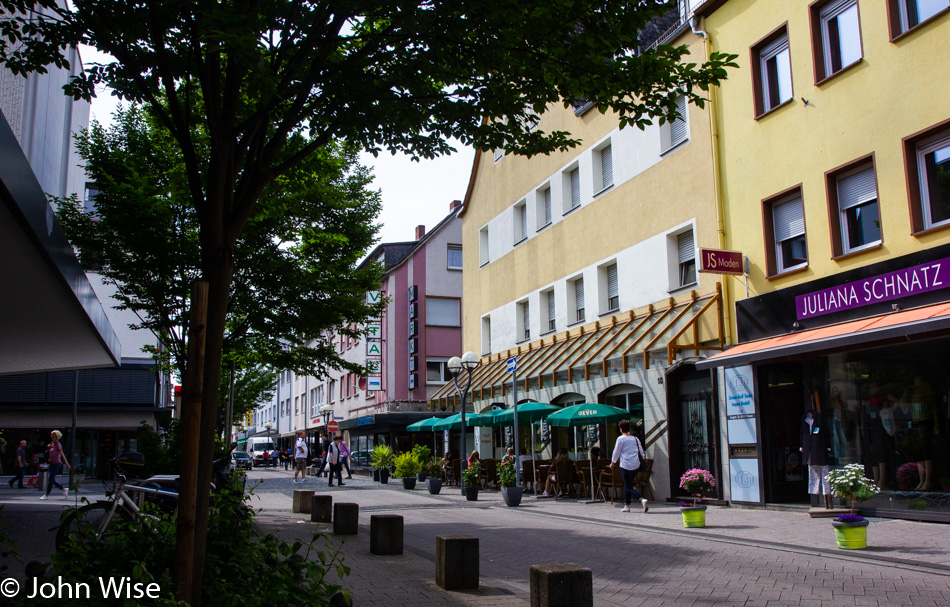
I sat down here mid-afternoon with a Döner Kebab (gyros) for no other particular reason that I knew if I didn’t stop and had I continued to walk and eat my lunch, I’d soon be wearing the garlic sauce that was certain to drip on me. All those years ago, when I first arrived in Germany I would choose random side streets to spend time, as these are the places where people who live here move through their environment. If I was going to feel like what it is to be a local, I needed to get off the beaten path where the tourists were out collecting their trophies.
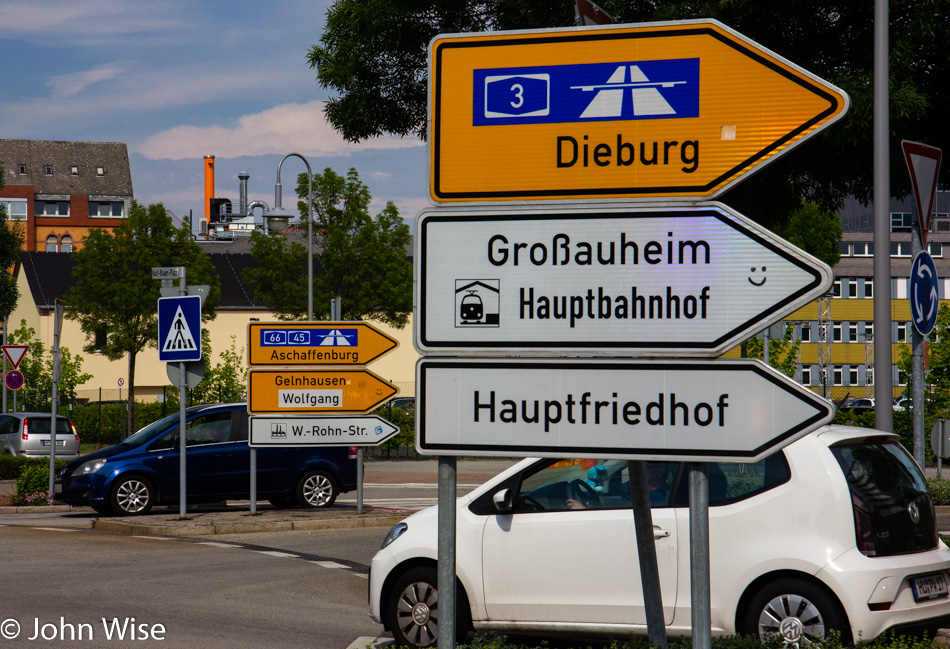
Done with lunch I was back on the same road back to the train station and again walking by the Hauptfriedhof (main cemetery).
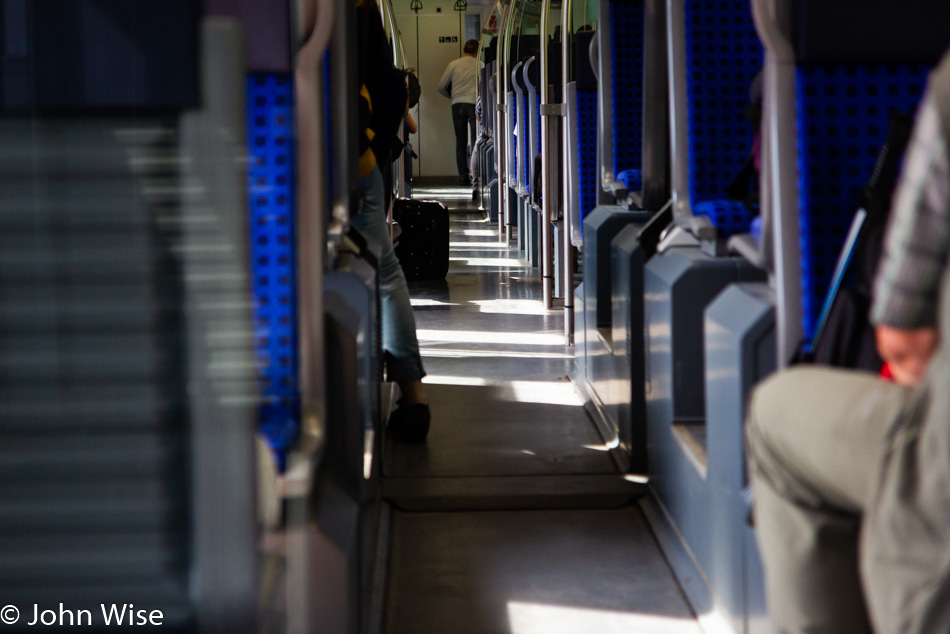
The S-Bahn that should have brought me back to Frankfurt needed another half hour to pick me up in Hanau, so I jumped on another train that was heading to Südbahnhof (south Frankfurt) and figured I’d transfer trains for the rest of the ride back into the city proper.
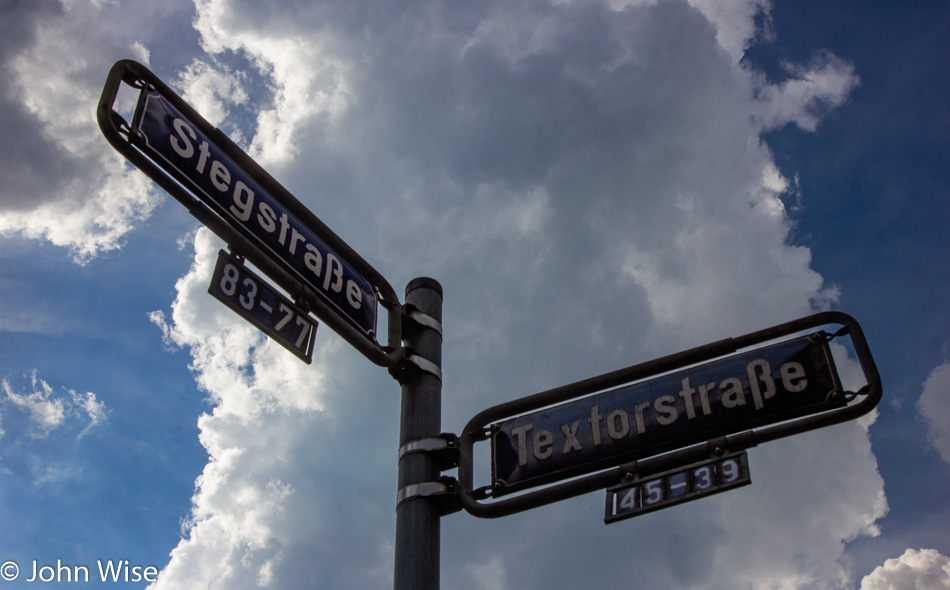
Once on the street, seeing this sign for Textorstrasse, I thought this was familiar for some reason. Down a way, it became apparent why: it’s Harmonie Kino over here. Harmonie is an art-house theater I’ve visited many a time, and if I’m not mistaken, it was Andy Warhol’s Flesh for Frankenstein I saw first and this is also where I watched Akira.
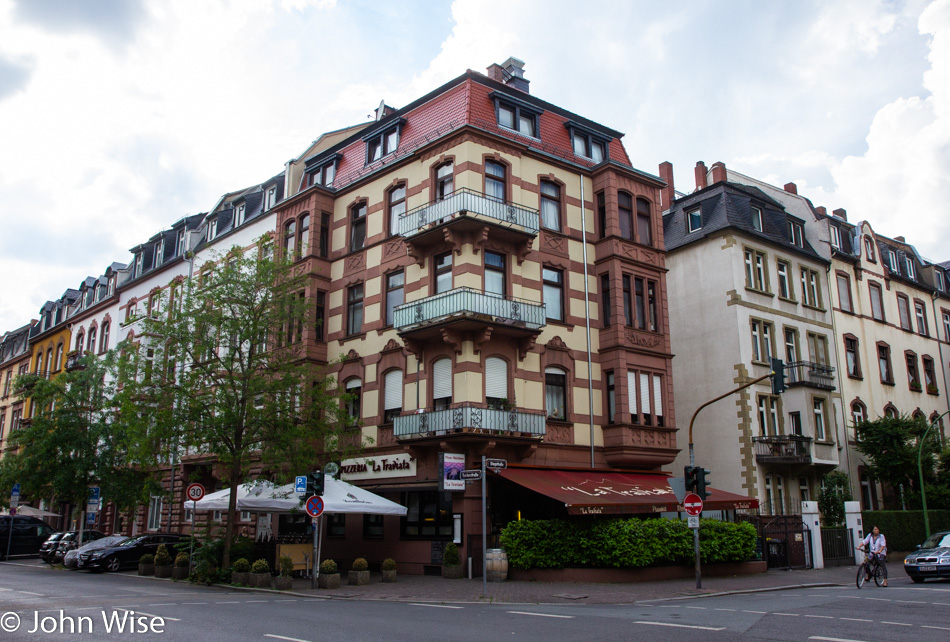
This is one of the most typical residential scenes in Frankfurt I’m familiar with: apartments with a small restaurant on the corner. I do miss this density of living, though the parking leaves a lot to be desired if it can be found.
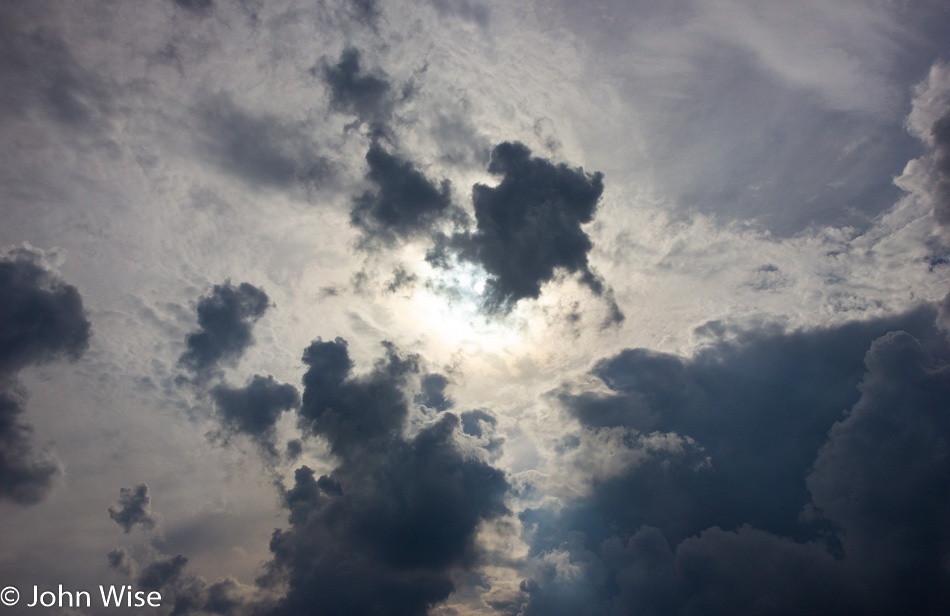
Reaching the Main River, it was starting to look foreboding in the distance as though I might have a rain encounter in my future.
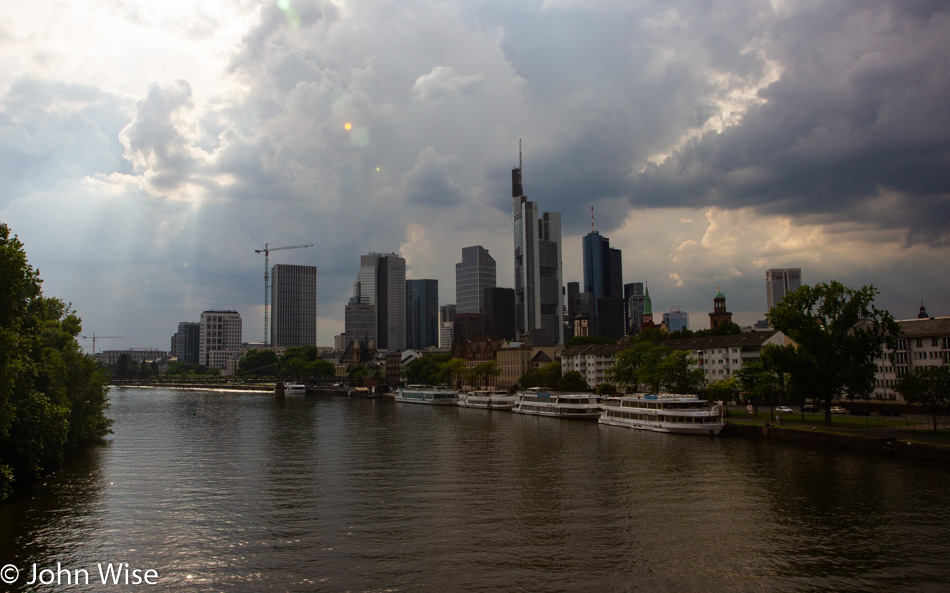
When you know what lies within this city and its cultural and historical offerings, you can’t help but be in love with it. With a vibrant food scene, a river, great music venues, nearby mountains, a perfect public transportation system, and more museums than can be visited in a week, Frankfurt is an easy place to live in. I should qualify that it is expensive, parking is atrocious, and big intellectual skills are required to find meaningful work.
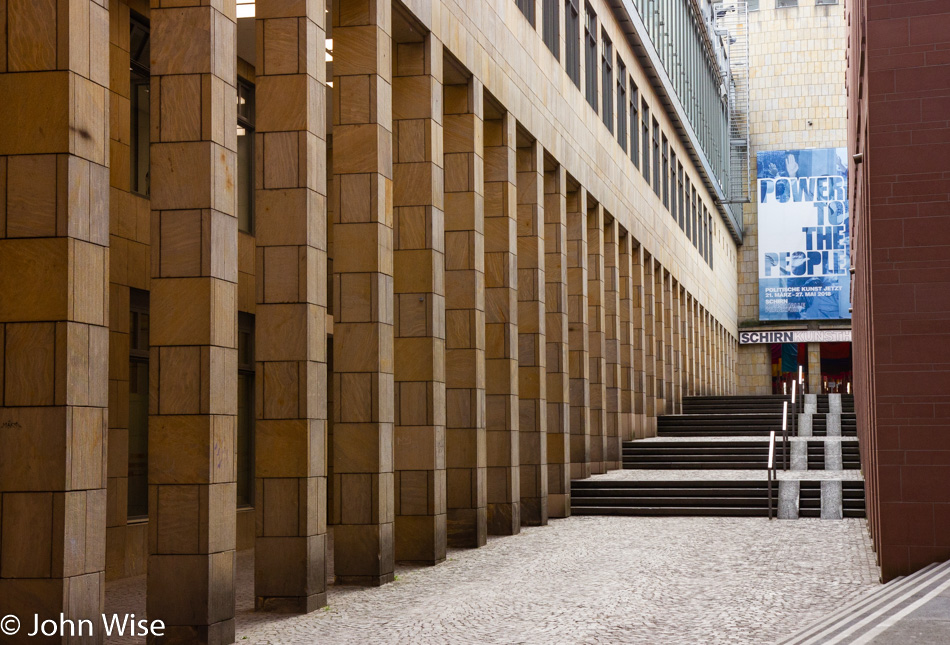
Speaking of museums, this is the Schirn Modern Art Museum.
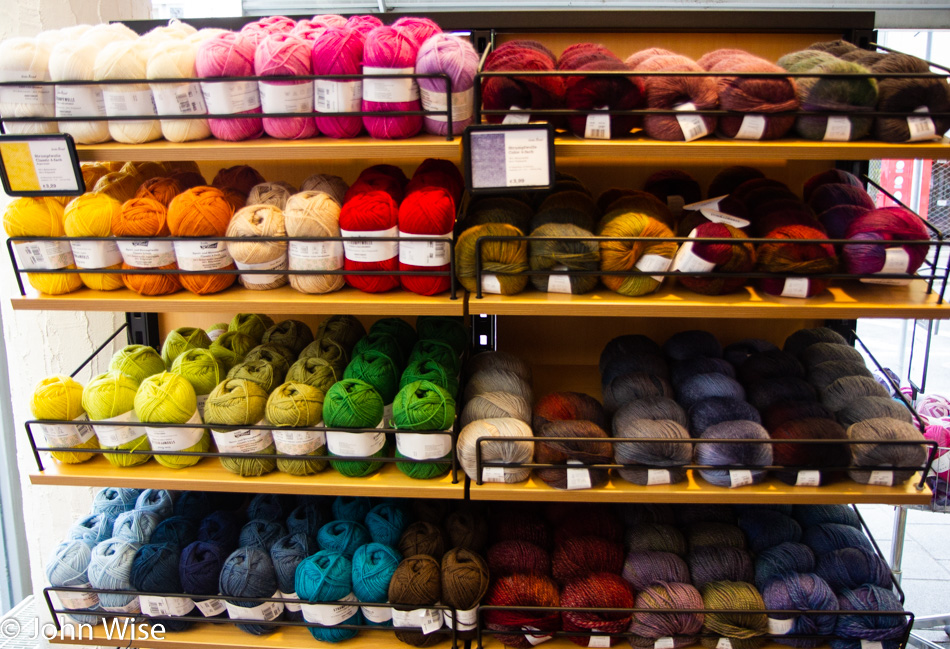
I stumbled across the Wolle Rödel yarn store by Kleinmarkthalle on my way through Konstablerwache. I picked up some sock yarn because one can never have enough handmade socks, and Caroline LOVES making me new socks.
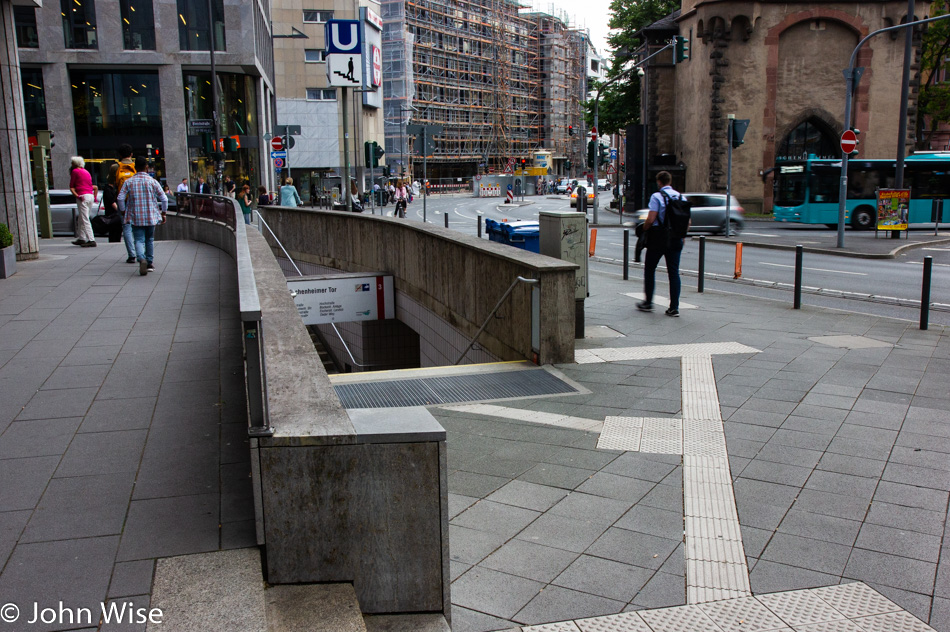
I’m starting to entertain the idea that I’m going to walk all the way to Heddernheim, where Klaus and Stephanie live. To be clear, Heddernheim is a city district of Frankfurt, and it’s not wrong to refer to it as Frankfurt, so there you go.
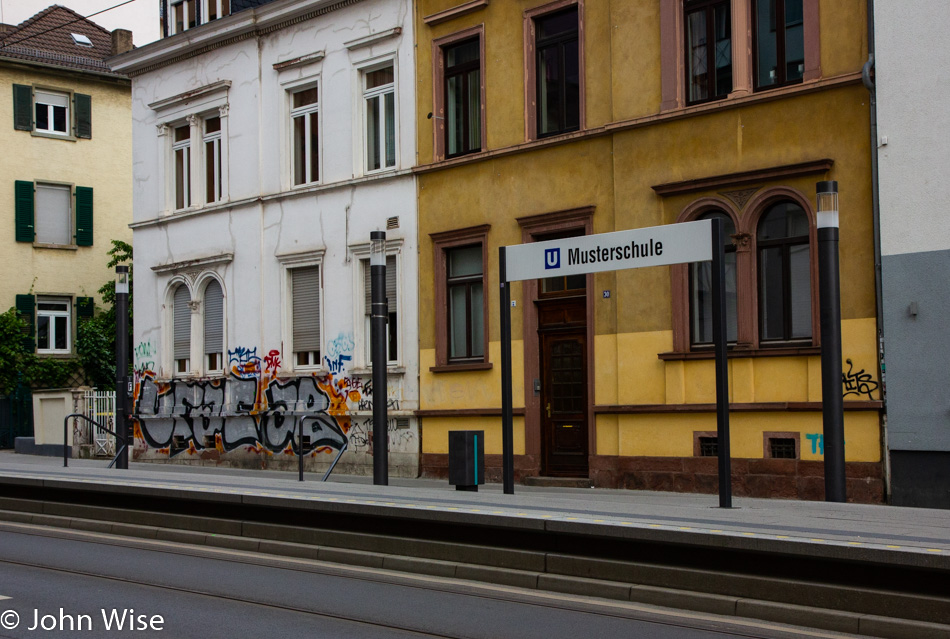
I’m heading into a neighborhood I’m very familiar with because North End is where I lived for six years, from 1989 until 1995, when Caroline and I moved to the United States.
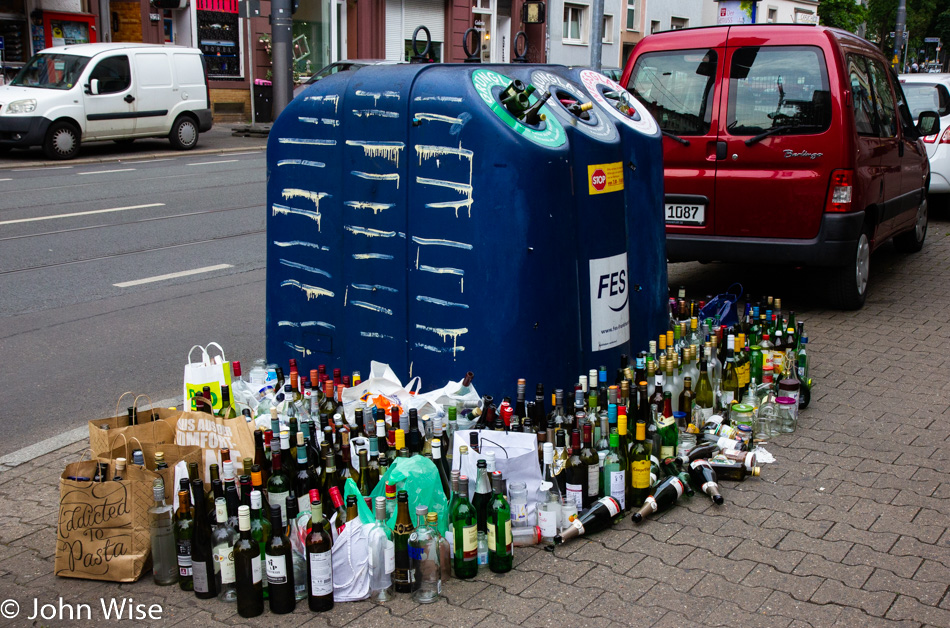
A recent strike from the people who collect the glass for recycling has resulted in the residents of Frankfurt putting on display just how much alcohol they drink. Surprisingly, there was no broken glass. You’ve got to love such a civilized population.
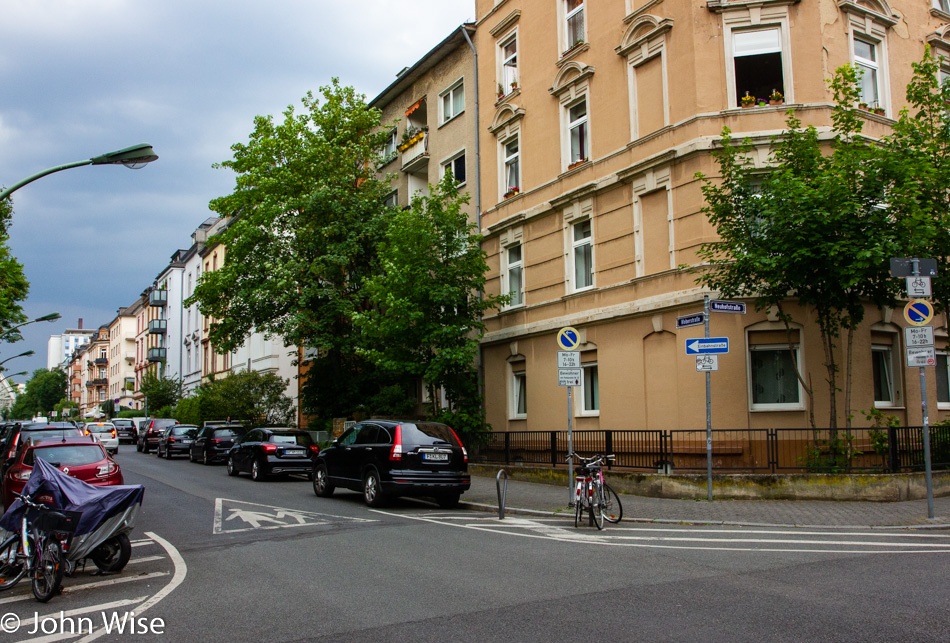
The corner of Neuhofstrasse and Weberstrasse is the location where I fell in love with Caroline on June 18, 1989, at around 5:00 in the morning, following our meeting up after seeing the Pixies the night before. We talked for some time outside the Batschkapp nightclub until it was so late that the trains had stopped running, so I gave her a ride home, which was one street over on Gluckstrasse. Until that minute when we kissed on the streetside, I did not have the slightest interest in Caroline, but after that first kiss, I was smitten. The rest is history.
Walking stats: 13 miles or 21.5 km with 21 floors climbed.